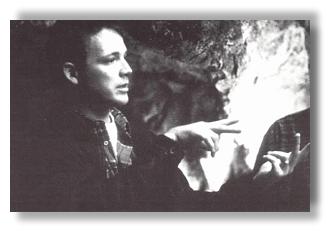
Paris At The Helm:
Robert Duncan McNeill
On His Shift
from Actor to Director
by Anna L. Kaplan
Cinefantastique
November 1997
© Frederick C. Clarke
At the end of the third season Robert Duncan McNeill was happy with the paths his character, Tom Paris, had taken. McNeill went through the informal Star Trek program for would-be directors, and got an unexpected chance to direct when Jonathan Frakes had to bow out of Sacred Ground due to pressing demands on Star Trek: First Contact. "Rick Berman gave me a call. I was at a Star Trek convention in Cleveland. It was about a week or two from shooting, at that time, so I wasn't prepared for it initially. I hadn't expected to direct quite that quickly, or have an assignment with such short notice, but I was really thrilled. That episode was the perfect first episode for me because I think it had what are my strengths. It had a real spiritual kind of story-a real character-driven story. It wasn't a big action show. It had a lot of wonderful characters in it. It had great guest stars, and I thought it was one of Kate's best performances."
Sacred Ground was a Janeway story. Did it make McNeill nervous to direct Kate Mulgrew his first time up? " No, it made me less nervous, because I have a good rela tionship with Kate," he said. "Kate's trailer and my trailer are sort of separated from the rest of the cast, just because of the way they're set up on the lot. I probably talk to Kate most often, because we're stuck there together. I know what a hard worker she is, and I was thrilled that she had the story for my first episode. We have such a great relationship. We were able to discuss the scenes in more depth than the average directors might." Mulgrew said that McNeill has a "velvet touch" as a director.
The next script McNeill landed in the rotation was Unity which reintroduced the Borg in an unexpected way. "I think the Borg was one of Star Trek: The Next Generation's greatest discoveries," said McNeill. They really haven't been exploited that much. "The Borg are the essence of evil in a way, and this was kind of showing the cracks in that evilness. If we deactivate these bad guys, than they're really not so bad after all. I was nervous that the fans were going to reject that, but I think that they were really interested in the idea."
Since Unity uses the Borg as a metaphor for the disintegrating Soviet Bloc, McNeill researched the history of it before directing the show. "l actually did some reading about that, about Russia and all the politics that went on," he said. "I think some of those ideas did come out in the story, even though it wasn't a really heavy, political episode. Yet there were some references and you could connect that to contemporary issues, individuality as opposed to group needs or desires. When Star Trek has got good ideas and strong writing, that's what it's good at-making people think. I think this episode definitely did that on a lot of levels, and it entertained them at the same time."
McNeill has seriously taken to directing. Usually actors get to direct one or maybe two episodes a season. "I hope I get to direct a lot more," he said. "There's always politics involved. Star Trek is well known for allowing the actors and crew and all sorts of people to learn about other things. I know that they don't want to all of a sudden just let me take off and start directing episodes when the other actors might have an interest as well. But I hope after doing these two they see that I'm really interested and can handle it and I get to do a bunch more. I'd love that."
McNeill also likes to see Voyager address the difficult issues and sometimes more unpleasant aspects of life. For example, he thought that Tom Paris was cleaned up a lot too easily. That was one of the reasons he liked The Chute. Noted Mc Neill, "l think sometimes the gritty side of Tom Paris was not explored because everybody felt once Paris got into Starfleet and was accepted on Voyager, that he would play by the rules for the most part, because otherwise he would lose his commission. Janeway would not put her faith in him if he were constantly breaking the rules and exploring his grittier, darker side. That was a great episode to explore that street-wise side of him. It didn't back off. A lot of times the writers or producers don't want to offend anybody, and they don't want to take the characters too far in some direction. So they play a middle ground that doesn't always take things as far as they could go. Emotionally, that episode allowed the actors to really hit some peaks and valleys; it had action and tension in it, and a lot of passion. It wasn't a squeaky clean Star Trek thing that very often is the mode."
McNeill cited Blood Fever as another strong third season show, with Torres in heat, choosing to mate with Paris. "I love when Star Trek allows the actors every now and then to really chew some scenery and not back off from something emotionally; but really put you in situations where you really get to feel things in a strong way and express it. I think it's a lot of fun to do that.
"I know next season they're going to explore that. They're going to play that for all they can. I think it's about time on Star Trek."
[Home] |
[NoJava Home] |
[Current News] |
[Biography]
[Filmography] |
[Mailing list] |
[Interviews] |
[Archives]
[Photo Gallery] |
[RanDoM Flight] |
[Awards/Vote/Legal Stuff] |
[Links]
